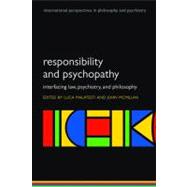
Note: Supplemental materials are not guaranteed with Rental or Used book purchases.
Purchase Benefits
What is included with this book?
| Contributors | p. ix |
| Introduction: interfacing law, philosophy, and psychiatry | p. 1 |
| Psychopathy and the law | |
| Psychopathy and criminal responsibility in historical perspective | p. 7 |
| Stabbing in the dark: English law relating to psychopathy | p. 25 |
| Psychopathy and the law: the United States experience | p. 41 |
| Policies, law, and psychopathy: a critical stance from political philosophy | p. 63 |
| Psychopathy: a new research paradigm | |
| Defending PCL-R | p. 79 |
| Psychopathy: assessment and forensic implications | p. 93 |
| Neuroimaging, genetics, and psychopathy: implications for the legal system | p. 125 |
| The treatment of psychopathy: clinical nihilism or steps in the right direction? | p. 155 |
| The responsibility of the psychopathic offender | |
| Responsibility and psychopathy | p. 185 |
| Psychopathy and answerability | p. 199 |
| Psychopathy, responsibility, and the moral/conventional distinction | p. 213 |
| Rationalism, emotivism, and the psychopath | p. 227 |
| Reasons, emotion, and moral judgement in the psychopath | p. 243 |
| The inauthentic evaluative schemes of psychopaths and culpability | p. 261 |
| Intentional action, moral responsibility, and psychopaths | p. 283 |
| Will a stroke of neuroscience ever eradicate evil? | p. 299 |
| Conclusions: psychopathy and responsibility, a rejoinder | p. 319 |
| Index | p. 325 |
| Table of Contents provided by Ingram. All Rights Reserved. |
The New copy of this book will include any supplemental materials advertised. Please check the title of the book to determine if it should include any access cards, study guides, lab manuals, CDs, etc.
The Used, Rental and eBook copies of this book are not guaranteed to include any supplemental materials. Typically, only the book itself is included. This is true even if the title states it includes any access cards, study guides, lab manuals, CDs, etc.